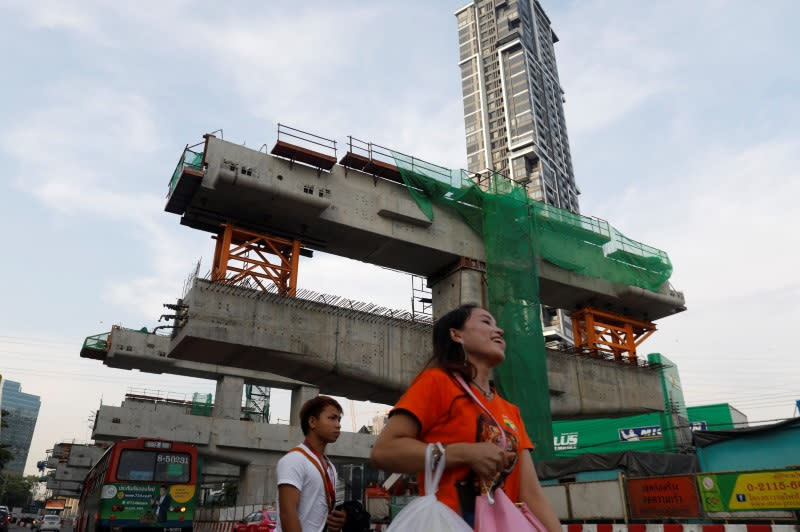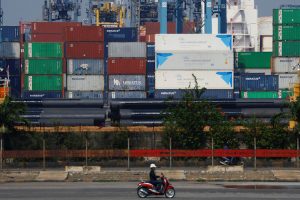Political upheaval caused by the dismissal of Thai Prime Minister Srettha Thavisin is likely to deal another blow to an economy that was already struggling.
Millions of people drowning in debt have been waiting for long-delayed cash handouts such as the Pheu Thai government’s controversial ‘digital wallet’ scheme.
Southeast Asia’s second largest economy grew 1.5% in the first quarter of 2024 compared to a year earlier, slowing from the prior quarter’s 1.7% expansion and lagging regional peers.
ALSO SEE: Thailand’s Ruling Party Races to Pick a New PM Candidate
The tourism-dependent country of close to 70 million people has struggled to recover from the Covid-19 pandemic, and major growth engines, including an automobiles sector that is the largest in the region, are still spluttering.
Tim Leelahaphan, senior economist at Standard Chartered Bank, said the political upheaval had cast doubts about the passage of the 3.75 trillion baht ($107 billion) national budget for fiscal 2025, as well as the 500-billion-baht nationwide cash handout that was a flagship Srettha policy.
“Political uncertainty and an unclear political outlook could have adverse implications for fiscal policy,” he said.
However, the caretaker deputy finance minister said on Thursday the budget would not be delayed.
Srettha’s ouster by the Constitutional Court on Wednesday came a fortnight after his government opened registrations for a scheme to give away 10,000 baht to 50 million Thais, a key election promise of Pheu Thai party.
Over 16 million people had applied to receive the “digital wallet” handout on the day registrations opened, crashing the system but signalling huge demand for the controversial scheme among ordinary Thais hurting from the slowing economy and high levels of personal debt.
Another sensitive proposal is the Pheu Thai government’s plan to open entertainment complexes with legal casinos in some tourist areas, such as Phuket, Chiang Mai, Chonburi (Pattaya), or Bangkok, given the prevalence of major organized crime networks in several neighbouring countries.
Housing debt among highest in Asia
Household debt stood at 16.4 trillion baht, or 90.8% of GDP, at the end of March, among the highest in Asia.
The central bank, which had bickered with Srettha’s administration over the scale of the handout, left its key interest rate unchanged at a more than decade-high of 2.50% for a fourth straight meeting in June.
It is expected to hold the rate again when it meets next Wednesday, on August 21.
Ballooning household debt has also hit the car industry. Thailand is home to the factories of Toyota Motor and Honda Motor, and overall production in the sector has dropped for 11 straight months into June as local sales slumped.
Exports of car and car parts also dropped 0.4% in the first half of 2024 from a year earlier, with main markets Malaysia and Vietnam down nearly 30% on the year, commerce ministry data showed.
Worst performing bourse in the region this year
Srettha’s removal underlines the deep fissures between the conservative-royalist establishment, backed by the military, and populist parties like the Pheu Thai. Both camps have been locked in a decades-long tussle, triggering coups in September 2006 and May 2014, plus severe bouts of unrest from 2008 to 2010.
In the absence of a lasting resolution to the conflict, Thailand’s long-term prospects remain uncertain, analysts say.
“Thailand has still not found a formula to bridge the country’s deep political divide,” Gareth Leather, a senior Asia economist at Capital Economics, said.
“Without one, uncertainty looks set to remain entrenched while economic populism is likely to become worse, with negative repercussions for investor confidence.”
Thailand’s stock market has been the worst performing bourse in Asia so far this year, down 9.3%.
Industrial sentiment also hit its lowest in two years in June, while consumer confidence reached an 11 month low in July.
There is huge concern over Chinese business groups attempting to push into various sectors of the economy – and indications there could be severe pushback against e-commerce groups such as Temu, and others seeking to buy restaurants or coaches in the transport sector.
Parliament will convene on Friday to elect a new prime minister, less than 48 hours after Srettha’s dismissal.
A Pheu Thai-led 11-party alliance holds 314 house seats, allowing it elect a prime minister on Friday, providing the coalition remains intact.
While on the streets Bangkok there is calm, analysts say the ongoing political drama could raise the risk of unrest. For now, some Thais are simply despondent.
“Just look at the economy now,” said Wilai, 60, a book shop owner who gave only one name. “I think if politics continue like this, the economy won’t be able to move forward.”
- Reuters with additional input and editing by Jim Pollard
ALSO SEE:
Top Court Dissolves Thailand’s Most Popular Political Party
Rush for Thailand’s $14-Billion Handout Scheme Hit by Glitches
Thai Economy Rocked by Factory Closures, Cheap Chinese Imports
Thai Task Force to Help Stop Arms Funding For Myanmar Military
Scamming Compounds in SE Asia Stole $64 Billion in 2023: Report
Big Tech ‘Doing Little’ to Counter Rampant Scams on Social Media
Thai Economy Recovering, But Clouds Linger Over Poll Outcome
Shadow of Thailand’s Military Hangs Over Latest Election Win
China’s Hozon Taps Thailand to Make EVs For Southeast Asia
























